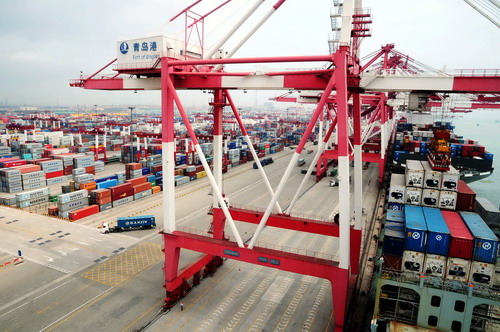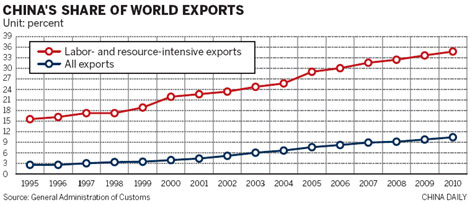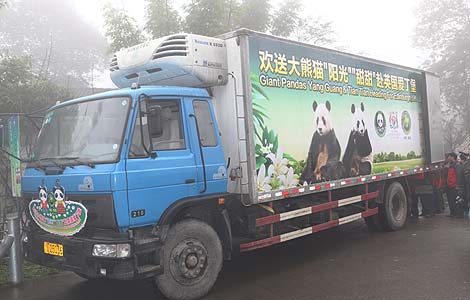Slice of export pie may shrink
Updated: 2011-12-13 09:28
By Wei Tian (China Daily)
|
|||||||||
Products still competitive but could be hurt by ebbing global demand
BEIJING - China's share of the world's total exports might decline for the first time in 16 years in 2012 because of weaker world demand and a stronger yuan, an expert from the country's top think tank said on Monday.
|
 |
|
Containers being loaded at Qingdao Port. The share of China's exports in the world's total increased from 4.3 percent in 2001, when China joined the World Trade Organization, to 10.3 percent in 2010.[Photo/China Daily] |
"Although 'Made-in-China' products are still the most competitive in the global market, the risk is that (the country's) share of the global export market may shrink," said Zhang Qizi, assistant director of the Institute of Economics at the Chinese Academy of Social Sciences (CASS).
The share of the nation's exports in the world's total grew from 4.3 percent in 2001, when China joined the World Trade Organization, to 10.3 percent in 2010.
Growth momentum slowed after the global downturn in 2008, but there could still be an increase in the share for 2011, Zhang said.
A decline next year would be the first since 1996. Zhang noted the uncertainties developing for the coming year and the declining competitiveness of China's exports amid the global downturn.
Anticipated weak growth rates in the United States and Europe pose large obstacles to China's exports and may trigger more protectionism against Chinese products, Zhang said.
According to the CASS outlook for China's 2012 industrial competitiveness, exports of resource- and labor-intensive products will remain the most competitive in China's export structure.
These Chinese exports account for 34 percent of all world exports in this category and are still increasing rapidly.
Although experts urged China to attach more importance to the service sector in its economic transition, the country's service-sector exports account for less than 5 percent of the global market, equivalent to one-third of the US level.
The CASS forecast comes as the country awaits the results of the 2011 Central Economic Work Conference, which will analyze the international and domestic economic situations and map out plans for economic development during 2012.
Ahead of the conference, President Hu Jintao said last week that China will continue to balance efforts to "ensure stable and relatively fast economic growth, while adjusting the economic structure and regulating inflationary expectations next year".
There are signs of a policy shift as increases in the consumer price index, a key inflation gauge, eased to 4.2 percent in November from this year's peak of 6.5 percent in July. Still, uncertainties remain in the nation's policy formulation process.
"The index may rebound in the last month of 2011 and until the Lunar New Year next year because of increasing demand for the festival," Zhou Wangjun, deputy chief of the price department of the National Development and Reform Commission, the top economic planner, told China Central Television on Monday.
Lunar New Year falls in late January, 2012.
There could also be more export deliveries at the end of 2011, ahead of Lunar New Year, perhaps sending "deceiving" data indicating strong exports, said Wang Tao, head of China economic research at UBS Securities Co Ltd, in a research note.
But Wang affirmed that China's trade surplus would narrow further in the coming months, and the amount will drop to an estimated $150 billion compared with $182 billion in 2010.
"This has caused foreign exchange reserves to accumulate slower than market predictions and changed the appreciation expectations for the yuan," Wang said.












